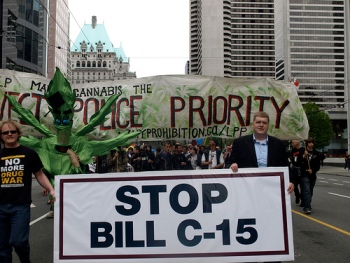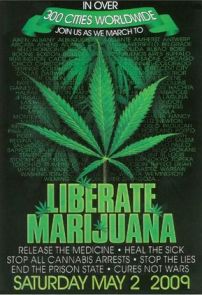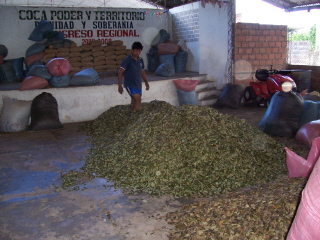The Mexican Congress has passed a bill that would decriminalize the possession of "personal use" amounts of illegal drugs. Some of the other provisions in the measure are not so nice.
If it's the first week in May, it must be time for the Global Marijuana March. Thousands took to the streets across the globe last weekend, and thousands more will do the same next weekend.
Marijuana's rise in the polls continues... and now we have a national poll showing majority support for legalization.
Thanks to your help, our "Changing Minds, Laws & Lives" 09 campaign has gotten off to a great start! Your support is still needed -- two exciting new t-shirts about drug prohibition are among the gifts we'd like to send you as our thanks.
La semana pasada fue una de esas ocasiones impresionantemente raras en que no topamos con ningún artÃculo sobre policÃas corruptos. ¡No hay por qué preocuparse! Esta semana han regresado de lo lindo. Cae otro alguacil fronterizo, quiebra una comisarÃa de policÃa de Carolina del Norte, un policÃa de Arizona se pone codicioso y pillan a otros dos agentes penitenciarios emprendedores.
There's been another California medical marijuana dispensary raid with the DEA involved, but so far, it looks like the real culprit is a crusading sheriff in Bakersfield.
Bryan Epis, one of a handful of people convicted in federal court for supplying medical marijuana under California's Proposition 215, is facing 10 years in prison. A three-judge panel of the US 9th Circuit Court of Appeals has ruled that should stick, but an appeal is pending.
In 2006, South Dakota became the only state to reject a medical marijuana legalization initiative. This year, the legislature ignored its opportunity to do something, so now proponents are gathering signatures for a retry in 2010.
Two-thirds of British Columbia voters favor marijuana legalization, according to a new poll. Now, if only someone would clue in the political parties that claim to represent them.
It's getting harder and harder to get prosecuted for drug possession in Argentina. The Argentine courts' slow drift toward decriminalization continued this week.
Jimmy Carter once let Evo Morales pick some peanuts on his Georgia farm. Now, Morales has invited Carter to pick some coca leaves on his farm in Bolivia's Chapare.
Events and quotes of note from this week's drug policy events of years past.
"Obama No Longer Supports Needle Exchange Programs That Reduce AIDS," "Gil Kerlikowske is the New Drug Czar," "The Drug Czar's Office Doesn't Know What to Say about Marijuana Legalization," "Will Legalization Actually Reduce the Black Market? Of Course," "Another Medical Marijuana Raid in California," "Arnold Schwarzenegger Calls for Marijuana Legalization Debate," "Ethan Nadelmann vs. Steven Colbert, Round Three," "Support for Marijuana Legalization is Huge in Canada," "Support for Marijuana Legalization Continues to Grow in America," Phil Smith previews: "Hello? Mexico on the Verge on Decriminalizing Drug Possession..."
Apply for an internship at DRCNet and you could spend a semester fighting the good fight!
Late last week, both houses of the Mexican Congress approved a bill that would decriminalize the possession of small amounts of drugs. The measure is part of a broader bill aimed at small-scale drug dealing and rationalizing Mexico's struggle against violent drug trafficking organizations.
The bill was sponsored by President Felipe Calderón, but support for it from his ruling National Action Party (PAN) has dwindled. Still, most observers who spoke to the Chronicle this week think he will sign the bill.
The Mexican Congress passed similar legislation in 2006, but then President Vicente Fox refused to sign it after hearing protests from the Bush administration. This time, though, there has not been a peep out of Washington either for or against the bill.
Among the bill's main provisions:
- Decriminalizes "personal use" amounts of drugs;
- Recognizes harm reduction as a guiding principle;
- Does not require forced drug treatment for "personal use" possessors;
- Recognizes traditional cultural drug use;
- Allows states and municipalities to prosecute small-time drug dealing ("narcomenudeo"), an offense which currently is handled exclusively by federal authorities;
- Allows police to make drug buys to build cases.
The amounts of various drugs that are decriminalized for personal use are:
- opium -- 2 grams
- cocaine -- ½ gram
- heroin -- 1/10 gram
- marijuana -- 5 grams
- LSD -- 150 micrograms
- methamphetamine -- 1/5 gram
- ecstasy -- 1/5 gram
The measure comes in the midst of ongoing high levels of violence as President Calderón attempts to crack down on Mexico's wealthy, powerful, and bloody-minded drug trafficking organizations -- the so-called cartels. Approximately 10,000 people have died in prohibition-related violence in Mexico since Calderón called out the armed forces against the cartels in early 2007. The multi-sided confrontation pits the Mexican state against the cartels, the cartels against each other, and even factions of the same cartel against each other.

discussion growing: Feb. '09 drug policy forum held by Mexico's Grupo Parlamentario Alternativa (grupoparlamentarioalternativa.org.mx/node/227)
The US backs Calderón's war on the cartels, allocating $1.4 billion over three years for Plan Mérida. President Obama reiterated his commitment to the Mexican drug war during a visit to the country last month.
The measure also comes against a backdrop of increasing drug use levels in Mexico and increasing concern about the problems associated with that drug use. In recent years, the cartels have figured out that their home country is also an increasingly lucrative market for their wares. Now, if you travel to the right neighborhoods in virtually any Mexican city, you can find storefront retail illegal drug outlets.
"This looks like one step forward, two steps back," said Isaac Campos Costero, an assistant professor of history at the University of Cincinnati and visiting fellow at the University of California at San Diego's Center for US-Mexican Studies. "If we're talking about reducing the crisis of violence in Mexico, I don't think this bill does anything good, and may even exacerbate it. It won't reduce demand, and at the same time it seeks to prosecute small-time dealers more energetically."
"That this suggests growing support for decriminalization, reduces the criminality of drug users, embraces harm reduction, and acknowledges cultural uses is a good thing and consistent with what is going on elsewhere in Latin America," said Ethan Nadelmann, executive director of the Drug Policy Alliance. "The idea of decriminalization of possession based in part on human rights and public health grounds has gained real traction in the region, which is somewhat surprising given the long preoccupation with drugs and organized crime," he said.
"But there's this other part of it that is all about Calderón's war on the traffickers; it's part and parcel of empowering law enforcement," Nadelmann continued. "There is serious concern that law enforcement has lost the upper hand to the gangsters, and the risk here is that the new law will give police all the more opportunity to go after low-level distributors and addicts who sell drugs to support their habits, while diverting attention from serious violent criminals."
For Mexican drug reformers organized as the Collective for Integrated Drug Policy, while the bill is an advance, its failure to more fully incorporate public health and human rights perspectives runs the risk of creating negative consequences for the country. In a statement released after the bill passed the Congress, the group praised the legislation for distinguishing between consumers, addicts, and criminals, for increasing the amount of marijuana from two grams to five, for acknowledging the role of harm reduction, and for removing the provision that would have required drug treatment for those caught holding.
But the group also expressed its preoccupation with other parts of the bill. "The law only marginally considers the problem of drug consumption and limits itself to legally defining it," the collective noted. "On the other hand, it focuses on intensifying a military and police strategy that has proven to be a failure."
The collective also worried that "the law will criminalize a vast group of people who make a living off small-time drug dealing" who are not cartel members but impoverished citizens. "Imprisoning them will not diminish the supply of drugs on the street, nor will it improve public security; yet it will justify the war on drugs, since the government will be able to boast the number of people incarcerated with this policy," the group wrote.
The decriminalization quantities are too small, the group said, and that will lead to problems. "These amounts are not realistic in terms of the drug market (for example, the initiative allows a consumer to have a half-gram of coke, when coke is sold on the streets by the gram), and we thus can anticipate a significant increase in corruption and extortion of consumers by police forces," the statement said.
Jorge Hernández Tinajero, an advisor to Social Democratic Party Deputy Elsa Conde, is also the leader of the collective. "Elsa went to the session and loudly criticized the bill, saying it was not an integrated policy but a new way to make more corruption and put more people in jail, especially women who desperately need to work and earn some money," he recounted. "She said 70% of the women in jail are there because they are small dealers."
"While the bill doesn't go far enough, it at least decriminalizes possession for personal use, and treatment is no longer mandatory if you get caught carrying your personal dose," said Dr. Humberto Brocca, a member of the collective. "Now, you will not have to show that you are an addict and thus a candidate for treatment," he said, referring to current Mexican law, which creates a loophole for addicts in possession of drugs.
"It's a mixed bag," said Ana Paula Hernández, a Mexico City-based consultant on drug policy and human rights. "The headlines will be that drug possession has been decriminalized, but when you look at it more closely, the consequences could be very serious," she said. "Now, state and local authorities will be able to prosecute crimes related to small-scale drug dealing. That would be good if Mexico were a different country, but corruption is so extreme at those levels that giving these authorities these powers could greatly increase their level of involvement in organized crime."
Whether the bill will have any impact at all on the major trafficking organizations who are ostensibly the target of the Mexican government's offensive remains to be seen.
"I don't think this is going to have any impact on the government's war against the cartels," said Hernandez. "For that to happen, we need to have a structural, democratic reform of police forces and the judiciary at the state and municipal level by reallocating resources for prevention and information campaigns on drug use with a risk and harm reduction perspective; and of course by other measures such as real decriminalization."
Brocca, too, foresaw more arrests as a result of the bill, but little impact on the violence plaguing the country. "Yeah, they will sweep up mostly small-timers so the party in power can look good," he said, "but it will probably have no impact whatsoever on the prohibition-related violence."
Whatever action Mexico takes is likely to have little impact on the violence without changes in US drug policies, Campos Costero said. Still, passage of the bill could have an important psychological effect, he said.
"From a symbolic point of view, once this goes into effect and Armageddon doesn't happen and society doesn't crumble, this may help break down attitudes a bit and pave the way for more substantive reforms in the future," said Campos Costero.
The bill could also undercut Mexico's historic opposition to relaxation of the drug laws north of the border. "Mexico has opposed US reform efforts on marijuana in the past, but by passing this bill, Mexico effectively reduces its ability to complain about US drug reform in the future," said Campos Costero. "And that's significant."
But that doesn't mean Mexicans would not raise a stink if the US moved toward radical drug reforms, Campos Costero noted. "For years and years, Mexicans have been hearing condescending remarks from the US about how they're not tough enough on drugs, so if the US were to pursue legalization, the Mexican public would go crazy. They see it as a demand problem, but of course, it's really a policy problem," he said. "If there were more rational drug policies, we could have demand at the same levels, but eliminate these problems."
back to top
Marijuana aficionados and reform supporters took to the streets of more than a hundred towns and cities across the globe last weekend in phase one of the annual Global Marijuana March.
The march, first organized in New York City in the 1970s, has since grown into a massive international event. This year, some 263 cities on every inhabited continent are listed as holding the marches.

Vancouver, British Columbia (courtesy cannabisculture.com)
Typically held the first weekend in May, the event this year was broken up into two weekends, largely to accommodate Europeans, where the May Day labor celebrations are taken far more seriously than in the US (where May 1 is not Labor Day, but
National Law Day).
Finland was the exception there, with a march in Helsinki last weekend drawing at least 300 people, and events in Tampere and Turku drawing about 200 people each.
But on this side of the water, marchers took to the streets in cities like Portland and Philadelphia, which both drew about a thousand people, among the largest crowds of the day. In San Francisco, where 15,000 people gathered last year, crowd size -- if not spirits -- was dampened by drenching downpours all day.
The marches also hit middle America, if in smaller numbers. In Champaign, Illinois, hundreds marched, while in Cincinnati a similar crowd gathered. In Ogden, Utah, 30 lonely cannabis supporters rallied together, while Palm Springs, California saw a few dozen marchers.
Things were a bit livelier in Canada, with some 15,000 people gathering in Toronto and a thousand more in Vancouver. Even Edmonton, way out on the northern plains of Alberta, drew several hundred participants.
"It was fantastic, we had a lot of people show up here in Vancouver," said Jeremiah Vandermeer, production editor for Marc Emery's Cannabis Culture magazine, one of the organizing foci for the marches. "It was a great march. The Liberals were having their convention here, so we marched on that shouting that they need to stop C-15, the Conservative bill that would impose mandatory minimum sentences even for growing one plant."
When asked why Canadian cities appeared to be able to generate larger turnout than American ones, Vandermeer made several points. "Canada has a very strong cannabis culture, we have a lot of organizers who have been working very hard for years, Marc Emery included, of course, and our newspapers are very friendly," he said. "They promote the marches before they even happen, and that's a big help."
While the US has its cannabis friendly elements and its veteran organizers, too, it does not generally have a press that is willing to provide free publicity beforehand for the marches. Nor, with the exception of the two groups mentioned below, do the marches garner any meaningful support from drug reform organizations. And, unlike the case in some European cities that draw huge crowds, events here have not drawn sponsors willing to put up cash to publicize the marches.
In some cities, events are organized by independent activists. In others, local chapters of groups like the National Association for the Reform of Marijuana Laws (NORML) and Students for Sensible Drug Policy (SSDP) take the lead. But in all cases, the size and success of the events is determined largely by local resources and talent.
"With some legitimate organization ahead of time and funding and promotion, perhaps these turnouts would be bigger, but as it stands now most of these US efforts are loosely organized at best, said NORML's Paul Armentano. "And perhaps culturally Americans are not as likely to take to the 'streets' as are their counterparts in other countries like Venezuela and Greece."

GMM 2009 poster (courtesy GMM)
is the primary US-based organizing focus for the Global Marijuana March. It does what it can, but its resources are limited.
"We at Cures Not Wars provide material and logistical support for the marches," said Douglas Greene, one of the group's cofounders, along with Dana Beal, the man present at the beginning. "But that support is basically limited to providing posters and contact lists, things like that. We don't have money to hand out to make them happen, so these marches are primarily financed by what the local grassroots people can do," Greene said.
"I think the 4/20 events just a couple of weeks before the marches may drain energy and resources from the marches," said Greene. "Press coverage helps, but unlike Canada, we don't have prior coverage here in any city I can think of."
Greene pointed to some of the European cities, such as Rome, Athens, London, and Berlin, that regularly see crowds of thousands or even tens of thousands. "In Berlin, where the events rival the size of the Boston Freedom Rally, they have at least 10 major sponsors. We don't get that in this country," he pointed out.
Greene also said that perhaps the drug reform community should rethink its disdain for the marches. "These have evolved into an expression of the cannabis community, and it's unfortunate that they haven't become something the broader drug reform community has come together on," he argued. "Here in New York City, we had a lot of kids chanting 'We smoke pot and we like it a lot!', and while that is not going to necessarily change the law, at the same time we always have people who come up to us who are really interested in learning and changing the laws. These marches are going to happen no matter what the reform community thinks; it seems like it would be a good idea if we could work together and attract some serious people and try to educate those people who show up."
The marches may not be politic, there may be too many tie-dyed t-shirts, too much hair, and an uncomfortable number of young-looking public tokers, but the marches aren't going away and they are an authentic expression of cannabis culture. Perhaps the different strands of the movement will find a way to move closer together.
back to top
Support for marijuana legalization or decriminalization among the American public continues to climb and may now be a majority position, if a pair of recently released polls are any indication. An ABC News/Washington Post poll released April 30 found that 46% of those surveyed supported "legalizing small amounts of marijuana for personal use," or decriminalization, while a Zogby poll released Wednesday found that 52% supported the legalization, taxation, and regulation of pot.
The 46% figure in the ABC News/Washington Post poll is the highest since the poll first asked the question in the 1980s, and more than double what the figure was just a dozen years ago. Support for decriminalization hovered at around one-quarter of the population throughout the 1980s, and was at 22% as recently as 1997. By 2002, support had jumped to 39%, and now it has jumped again.
When it comes to political affiliation, support for decrim is at 53% for independents, 49% for Democrats, and 28% for Republicans. Since the late 1980s, Democratic support has jumped by 29 points and independent support by 27. Even among Republicans, support for decrim has increased by 10 points.
Support was highest among people reporting no religious affiliation, with 70%, and lowest among evangelical white Protestants, at 24%. People under age 30 supported decrim at a rate of 57%, nearly twice that of seniors, at 30%. People in between the young and the old split down the middle.
The numbers were even better in the Zogby poll. Confronted with a straightforward question about marijuana legalization, 52% of respondents said yes, 37% said no, and 11% were not sure.
The pollsters asked: "Scarce law enforcement and prison resources, a desire to neutralize drug cartels and the need for new sources of revenue have resurrected the topic of legalizing marijuana. Proponents say it makes sense to tax and regulate the drug while opponents say that legalization would lead marijuana users to use other illegal drugs. Would you favor or oppose the government's effort to legalize marijuana?"
The poll was commissioned for the conservative-leaning O'Leary Report and published Wednesday as a full page ad in the Washington, DC, political newsletter The Hill. In that poll, the sample of respondents was weighted to reflect the outcome of the 2008 presidential race, with 54% Obama supporters and 46% McCain supporters.
"This new survey continues the recent trend of strong and growing support for taxing and regulating marijuana and ending the disastrously failed policy of prohibition," said Rob Kampia, executive director of the Marijuana Policy Project."Voters are coming to realize that marijuana prohibition gives us the worst of all possible worlds -- a drug that's widely available but totally unregulated, whose producers and sellers pay no taxes but whose profits often support murderous drug cartels," Kampia said. "The public is way ahead of the politicians on this."
back to top
Dear Drug Policy Reformer,

Right now, the entire nation is focused on changing priorities and changing "business as usual."
That's why this year's campaign, "Changing Minds, Law & Lives," pulls out all the stops to make our case: the Drug War is a waste of time, money and good people's lives.
Thanks to friends like you, I'm glad to report it's off to a great start!
It's not too late for you to renew your commitment to drug policy reform and get your free gifts. For a contribution of $36, you can choose either "Prohibition Doesn't Work" or "STOP" (click for an enlarged view). For a gift of $60 or more, you get both shirts. And for a contribution of $100 or more, you also get your choice of any item from the StoptheDrugWar.org inventory.
Your contribution today will make an immediate impact by helping us:
- Produce more internet videos like "SWAT Raids — No One Is Safe" and fund more initiatives like the News Rewriting Project.
- Build the groundswell for change by helping grassroots organizations — our movement's "boots on the ground."
- Pressure the Obama Administration to make good on all of its promises and lobby Congress to make smart funding choices.
- Break more records! With each improvement to the StoptheDrugWar.org web site, the world's #1 source for news, information and activism promoting sensible drug law reform, we can get more visitors and become an even more powerful resource in the fight to end prohibition.
What we're doing together is working. Please help us take advantage of this unique opportunity to build momentum in 2009!
Sincerely,

David Borden
Executive Director, StoptheDrugWar.org (DRCNet)

P.S. Please join us in "Changing Minds, Laws & Lives" by renewing your generous support of StoptheDrugWar.org today. It's time to stop wasting time, money and good people's lives!
back to top
La semana pasada fue una de esas ocasiones impresionantemente raras en que no topamos con ningún artÃculo sobre policÃas corruptos. ¡No hay por qué preocuparse! Esta semana han regresado de lo lindo. Cae otro alguacil fronterizo, quiebra una comisarÃa de policÃa de Carolina del Norte, un policÃa de Arizona se pone codicioso y pillan a otros dos agentes penitenciarios emprendedores.
En San Antonio, el viernes pasado un ex alguacil de la Comarca de Starr se confesó culpable de un cargo de narcotráfico por ayudar al Cartel del Golfo mexicano a contrabandear drogas a través de su comarca fronteriza. El ex alguacil Reymundo âReyâ Guerra fue arrestado el octubre último después de convertirse en una de las 29 personas incriminadas por un gran jurado federal estadounidense. Ãl admitió transmitir información a un informante que sabÃa que habÃa vuelto a trabajar para el cartel a cambio de pagos de US$ 2.000 a US$ 3.000. Ãl también admitió transmitir información sobre la persona que avisó a las autoridades en una redada que resultó en la incautación de 314 kilogramos de marihuana y uno de cocaÃna. Guerra se confesó culpable de un cargo de confabulación para distribuir estupefacientes como parte de un acuerdo de confesión de culpabilidad en que se retiraron dos otros cargos. Ãl puede recibir una condena de 10 años a cadena perpetua cuando lo sentencien en julio. Hasta entonces, permanece en libertad bajo fianza.
En Spring Lake, Carolina del Norte, la PolicÃa de Spring Lake ha sido cerrada después que dos de sus oficiales fueron arrestados el lunes por cargos de corrupción y abuso de autoridad. El oficial Alfonzo Whittington Jr. fue incriminado por un gran jurado especial de la Comarca de Cumberland por 11 cargos, incluso malversación de parte de policÃa, obtención de propiedad mediante fraude, hurto y obstrucción a la justicia. Esos cargos dimanan del robo de US$ 2.900 del depósito de pruebas de la comisarÃa, del cual Whittington se hacÃa cargo. El sargento Darryl Coulter Sr. responde ante Justicia por 20 cargos, incluso allanamiento de morada, secuestro y obstrucción a la justicia. Dichas acusaciones dimanan de una âredada antidrogaâ de abril del 2008 en que invadió un domicilio ocupado por tres hombres, los agredió, los amenazó con una pistola y una escopeta y los retuvo contra su voluntad con esposas. Otros cargos provienen de una redada contra una habitación de un motel de la zona en que Coulter incautó US$ 2.900 de una habitación en que él dijo que olfateó marihuana. Son los mismos US$ 2.900 que Whittington es acusado de robar del depósito de pruebas. Whittington puede recibir 24 años de prisión y Coulter 32. La comisarÃa quedó prohibida de investigar homicidios después que estropeó alegaciones de abuso infantil y un niño fue asesinado. Eso pronto se expandió a todos los delitos al paso que el alcalde del municipio le pedÃa a la Agencia Estatal de Investigación que investigara la brigada antidroga de la comisará. Ahora la han excusado de investigar aun casos de delitos leves y la jefatura de policÃa de la comarca ha asumido los deberes policÃacos del municipio.
En Tucson, un ex teniente de la PolicÃa de Tucson Sur fue sentenciado a tres años de prisión por malversar más de US$ 450.000 en fondos de la incautación de activos y dinero del depósito de pruebas. El ex teniente Richard GarcÃa tenÃa total responsabilidad por gestionar el programa de incautación de activos y era el único guardián del depósito de pruebas de la comisarÃa. Ãl admitió robar el dinero para financiar su vicio en juego, comprar alcohol e ir a clubes de estriptis. Se confesó culpable de cargos de los delitos de robar una organización que recibe fondos federales y presentar declaraciones falsas del impuesto sobre la renta. También debe devolver US$ 450.000 cuando salga en cuotas de US$ 200 al mes. A ese ritmo, la comisarÃa recobrará sus pérdidas en algún momento del Siglo XXIV.
En Los Ãngeles, el miércoles acusaron a un ex subalguacil de la Comarca de Los Ãngeles de intentar introducir drogas contrabandeadas en una instalación carcelaria comarcal en Castaic, donde trabajaba como carcelero. Peter Felix, 25, se declaró inocente de confabulación para contrabandear drogas en la cárcel y también de otros seis cargos relacionados con las drogas. Felix habÃa trabajado en la comisarÃa durante dos años hasta renunciar el octubre pasado cuando los investigadores lo pillaron recibiendo dinero y drogas de un cómplice.
En Dover, Delaware, un guardia del Centro Correccional de Delaware fue arrestado el sábado con 28 gramos de marihuana que pretendÃa contrabandear en la cárcel. El guardia Sidney Nunn, 25, cayó después que investigadores del consejo de asuntos internos en la prisión comunicaron a la PolicÃa de Dover la información que habÃan desarrollado. Ahora Nunn responde ante Justicia por cargos de tenencia con la intención de entregar marihuana, mantenimiento de vehÃculo, confabulación, tenencia de pertrechos para consumo de drogas y fomento del contrabando en la prisión. Lo pusieron en liberta después de pagar su fianza estipulada en US$ 8.000. Está de licencia con goce de sueldo.
En Greece, Nueva York, el martes denunciaron a un policÃa de Greece por cargos de coaccionar a una mujer que pilló fumando marihuana a tener relaciones sexuales con él. El oficial Gary Pignato fue acusado de cohecho de parte de funcionario público y dos delitos leves: coerción en el segundo grado e improbidad. Pignato ya va a juicio el 1º de junio en un caso parecido en que presuntamente fue a una residencia por una llamada de pelea doméstica, luego informó a la mujer que la arrestarÃa por infringir las condiciones de su régimen de libertad vigilada si no tuviera relaciones sexuales con él. En el caso del martes, Pignato presuntamente siguió a su vÃctima hasta su casa en su patrullero en una noche del 2005, le dio su tarjeta y le pidió su número telefónico. Al dÃa siguiente, la vÃctima estaba fumando un pitillo en su comedor cuando Pignato entró sin ser anunciado y amenazó arrestarla. âPodemos hacer que no pase nadaâ, habrÃa dicho. Tener relaciones sexuales con él âse encargarÃa de elloâ. La vÃctima dijo que manejó hasta su casa la noche siguiente para tener relaciones sexuales con él, pero siguió fastidiándola con pedidos de más sexo en los dÃas siguientes hasta que amenazó contarlo a su novia. La vÃctima dijo que se inspiró a dar parte de ello tras leer sobre los cargos interpuestos contra Pignato en el primer caso.
back to top
A Bakersfield medical marijuana dispensary was raided Wednesday afternoon by Kern County sheriff's deputies and DEA agents. Three men were arrested, and police said they seized two pounds of marijuana and two loaded handguns.
The target of the raid was the Green Cross Compassionate Co-op at 309 Bernard Street in east Bakersfield, one of the first to open in the city since Sheriff Donny Youngblood raided a half-dozen dispensaries in 2007. Youngblood has said he will not interfere with the operation of nonprofit medical marijuana co-ops, but he has also said that dispensaries for profit should expect to be treated like drug dealers.
It is unclear at this point how Youngblood determined the Green Cross Compassionate Co-op was not a legal co-op under California law and guidelines issued by the state attorney general.
US Attorney General Eric Holder has said that the Justice Department would not act against California dispensaries unless they violated both state and federal law. At least one dispensary, Emmalyn's in San Francisco, has been subjected to a DEA-led raid.
But Wednesday's Bakersfield raid appears to have been led by the crusading Sheriff Youngblood. A DEA spokesman told local media its agents were there only in a backup capacity.
back to top
In an unpublished opinion issued last month, a three-judge panel of the US 9th Circuit Court of Appeals in San Francisco has upheld the 10-year mandatory minimum federal prison sentence of Bryan Epis, the first medical marijuana supplier prosecuted in federal court after the passage of Proposition 215 in 1996, though not the first convicted.

Bryan Epis reunited with his daughter, Ashley, on being released in 2004 following an initially favorable ruling on medical marijuana by the 9th Circuit
Epis, of Chico, was arrested by Butte County officers in June 1997 and ultimately convicted by a federal jury in 2002 of conspiring to grow more than a thousand marijuana plants. Authorities only seized 458 plants from his home, but presented records suggesting more plants had been grown there.
Epis had a doctor's recommendation to use medical marijuana for chronic back and shoulder pain. He said he was growing for a Chico patients group and admitted selling some plants at cost to co-op members. But federal prosecutors portrayed him as a drug dealer with dollar signs in his eyes.
He and his attorney, Brenda Grantland, appealed the sentence on various grounds, but the three-judge panel didn't go for any of them. Epis had no reason to believe Prop. 215 would shield him from federal law, especially because "a large-scale marijuana operation can have an impact on interstate commerce," they wrote, harking back to the Supreme Court decision in Raich v. Gonzalez that established federal primacy over state law. Epis served a little over two years on his sentence before being released on bail in 2004 as he appealed his case. Grantland will request that his bail be continued pending an appeal to the full 9th Circuit.
Epis supporters expressed shock and outrage at the decision. "This is an egregious miscarriage of justice with no conceivable benefit to the public," said California NORML coordinator Dale Gieringer, "Bryan Epis believed he was acting lawfully. To imprison him for 10 years is the kind of sentence one might expect only from judges who countenance torture," Gieringer added, taking a direct swipe at panel member Judge Jay Bybee, now infamous as one of the authors of the Justice Department memos justifying torture during the Bush administration.
back to top
In 2006, South Dakota became the only state to defeat an initiative legalizing the medicinal use of marijuana, with proponents coming close, but ultimately short, with 48% of the vote. Now, after the state legislature ignored an opportunity to act on the issue this year, activists are ready to try the voters once again.
South Dakotans for Safe Access filed papers Monday to put its proposed initiative on the 2010 ballot. Supporters need to gain 16,776 valid signatures of registered voters by next April 6 to make the ballot.
Under the proposed measure, patients with debilitating medical conditions and a doctor's recommendation -- or their designated caregivers -- could possess up to six plants and one ounce of usable marijuana, as well as incidental seeds, stems, and roots. Patients would register with the state and be issued ID cards.
The movement is in stronger shape in South Dakota this time, organizer Emmett Reistroffer of Sioux Falls told the Rapid City Journal. It has more patients, doctors, former law enforcement officials, and others than in 2006, he said. "They know this law is best for South Dakota versus what we have now, which calls these patients criminals," said Reistroffer.
The effort will run up against a Republican political establishment implacably opposed to medical marijuana. Attorney General Larry Long earlier this year refused the opportunity to work with proponents to address law enforcement concerns and objections. But at least one thing will be different: In 2006, the Bush administration sent the drug czar's office to South Dakota to energize opposition to that initiative. There is little indication the Obama administration will go to the same effort to interfere in state medical marijuana initiatives.
back to top
An Angus Reid Strategies poll of British Columbia adults released Monday has found that 65% favored legalizing marijuana as a means of reducing gang violence, while only 35% favored increasing marijuana trafficking penalties. The poll comes as the Conservative federal government seeks to increase penalties for marijuana trafficking offenses and with BC provincial elections looming.
Given a context of recent highly-publicized gang violence in Vancouver, Angus Reid shaped its polling question to reflect that concern. Pollsters asked respondents: "The illegal marijuana industry is linked to much of the gang violence on BC's streets. Some people say that violence would be reduced if marijuana was legalized, while other people say the violence would be reduced if penalties for marijuana trafficking were significantly increased. Which of the following statements is closest to your own view?"
The highest support for legalization came among supporters of the Green and New Democratic Parties, which generally poll behind the Liberals and Conservatives. Among Greens, support for legalization was 77%; it was 74% among NDP supporters.
While respondents favored legalization over increased criminalization by a margin of nearly two-to-one, their response to a question about lax enforcement of laws against "soft drugs" was more evenly divided. A tiny majority, 51%, said that enforcing laws such as those banning marijuana possession made criminals out of law-abiding citizens, while 49% said not enforcing those laws lets criminals go free, which could lead to violence.
Earlier in this decade, Canada was seen as a beacon of progress on marijuana reform. It became the first country to legalize medical marijuana in 2002, and two years later, the Liberal government of Paul Martin reintroduced a bill that would have removed criminal sanctions for the possession of less than 15 grams of pot. But that bill was never put to a vote, the Liberals lost power, and the current government of Stephen Harper is dogmatically opposed to marijuana law reform.
That opposition is shared by the leadership of the BC NDP and Liberals. Earlier this month, BC Liberal leader Gordon Campbell said he opposed marijuana decriminalization, adding: "We need to listen to the police on how to deal with this." BC NDP head Carole James also acted the naysayer, declaring: "It's a federal issue as we all know. It's not something individual provinces can take a look at."
With legalization sentiment at roughly two-thirds of the electorate, politicians who oppose it might want to think again. Winning elections is tough when you're aligned against the majority on a high-profile issue. And marijuana politics is high profile in BC.
back to top
Continuing their slow crawl toward the effective decriminalization of drug possession, the Argentine courts have again thrown out a drug case, ruling it should not be prosecuted because the drugs were for "personal use." The case is only the latest in a line of cases dating back to 2006 where Argentine courts have declared the country's drug laws invalid when it comes to possessing small amounts of drugs.
In the present case, a young Argentine was arrested at a rave in Buenos Aires as he purchased 15 Ecstasy tablets for himself and seven comrades. The trial judge ordered that the case move forward because he found that the young man had bought the drugs either to sell them or to use himself.
But the Federal Court of Appeals for Buenos Aires overruled the trial judge, saying "it was not possible to discard the possibility that the narcotics were for personal use." Citing a 2006 Supreme Court ruling that it was the burden of the state "to demonstrate unequivocally that the drugs were not for personal use," the appeals court held that the portion of the country's drug law regarding drug possession must be declared unconstitutional.
Similarly, in late March, Buenos Aires judges threw out the case of two people arrested for growing pot plants. In that case, too, the judges found that the portion of the law punishing people with jail time for growing plants for personal use was unconstitutional. According to the judges, "the quantity and the circumstances that surrounded this case allow them to affirm that the cultivation or sowing of marijuana was for personal consumption."
While the lower courts are not shy about declaring portions of the drug law unconstitutional, it is the Argentine Supreme Court that is the ultimate arbiter. But the decisions from the lower courts are piling up.
back to top
At a Saturday meeting in the Bolivian capital of La Paz, former US President Jimmy Carter accepted an invitation from Bolivian President Evo Morales to go pick coca on Morales' coca farm in the Chapare, Agence France-Presse reported. The stop was part of a nine-day trip to Bolivia, Brazil, Ecuador, and Peru by the Nobel Peace Prize winning former president.

Drying the leaves in the warehouse. The sign reads ''Coca Power and Territory, Dignity and Sovereignty, Regional Congress 2006-08''
Morales, a former coca grower union leader, launched the invitation amidst smiles at a press conference following a private meeting with the ex-president, saying that he had a long friendship with Carter, who had invited him to pick peanuts on his Georgia farm. "One time, he invited me to visit his family and house, and I harvested peanuts on his land in Atlanta," Morales said. "Now, I invite him to the Chapare to harvest coca... it will be the next time he comes."
"Since President Morales has come to my property and evidently picked some peanuts, I hope that in my next visit I can go to the Chapare, where he has invited me to go harvest coca leaves," Carter replied.
Carter is scheduled to be back in Bolivia in December. At that time, Bolivia will be undergoing general elections in which Morales is seeking reelection until 2015.
Bolivia is the world's third largest coca producer, behind Colombia and Peru. Under Morales, the country has embarked on a policy of "zero cocaine, not zero coca," which has brought it into conflict with the US and with the United Nations' international drug control apparatus. Bolivia expelled the US ambassador and the DEA last fall.
back to top
May 14, 1932: "We Want Beer" marches against alcohol prohibition are held in cities across America -- 15,000 union workers demonstrate in Detroit alone.
May 14, 1993: The New York Times reports that Judge Whitman Knapp said, "After 20 years on the bench I have concluded that federal drug laws are a disaster. It is time to get the government out of drug enforcement."
May 13, 1996: The Weekly Standard reports: "Coast Guard cocaine and marijuana seizures are down 45 and 90 percent, respectively, since 1991. In 1994, the Customs Service let two million commercial trucks pass through three of the busiest ports-of-entry on the Mexican border without seizing a single kilogram of cocaine. Between 1993 and early 1995, the estimated smuggling 'disruption rate' achieved by federal interdiction agencies fell 53 percent -- the equivalent of 84 more metric tons of cocaine and marijuana arriving unimpeded in the United States each year."
May 12, 1998: The American Civil Liberties Union (ACLU) places an ad in the New York Times Op-Ed section headlined, "Let me ask you something... If you had a choice, what would it be, Marijuana or Martinis?" Note: The ACLU has opposed marijuana prohibition since 1968, and overall drug prohibition since 1994.
May 11, 2000: Mexican cartel leaders the Arellano-Felix brothers are charged with 10 counts of drug trafficking, conspiracy, money laundering and aiding and abetting violent crimes. The US State Department offers a $2 million reward for information leading to their arrest and conviction.
May 9, 2001: The Bush Administration announces its intention to nominate US Representative Asa Hutchinson, Republican of Arkansas, to the position of Administrator of the Drug Enforcement Administration, replacing Acting Administrator Donnie Marshall.
May 9, 2001: At a hearing, Attorney General John Ashcroft testifies that the Justice Department has no higher priority than preventing terrorism. But a day later the department issues budgetary guidance for FY2003 to make reducing the trafficking of illegal drugs one of the two top priorities.
May 10, 2001: President Bush nominates John P. Walters as America's new Drug Czar.
May 8, 2002: The Black Ministers Council of New Jersey announces a campaign to inform minority drivers that they have a right to refuse to submit to automobile consent searches, which have been the focus of the fight over racial profiling. The ministers said at a State House news conference that they would begin their "Just Say No" campaign the following week, in the form of messages to minority churches and the news media.
back to top
Along with our weekly in-depth Chronicle reporting, DRCNet also provides daily content in the way of blogging in the Stop the Drug War Speakeasy -- huge numbers of people have been reading it recently -- as well as Latest News links (upper right-hand corner of most web pages), event listings (lower right-hand corner) and other info. Check out DRCNet every day to stay on top of the drug reform game! Check out the Speakeasy main page at http://stopthedrugwar.org/speakeasy.

prohibition-era beer raid, Washington, DC (Library of Congress)
Since last issue:
Scott Morgan writes: "Obama No Longer Supports Needle Exchange Programs That Reduce AIDS," "Gil Kerlikowske is the New Drug Czar," "The Drug Czar's Office Doesn't Know What to Say about Marijuana Legalization," "Will Legalization Actually Reduce the Black Market? Of Course," "Another Medical Marijuana Raid in California," "Arnold Schwarzenegger Calls for Marijuana Legalization Debate," "Ethan Nadelmann vs. Steven Colbert, Round Three," "Support for Marijuana Legalization is Huge in Canada," "Support for Marijuana Legalization Continues to Grow in America."
Phil Smith previews: "Hello? Mexico on the Verge on Decriminalizing Drug Possession..."
David Guard posts numerous press releases, action alerts and other organizational announcements in the In the Trenches blog.
Please join us in the Reader Blogs too.
Again, http://stopthedrugwar.org/speakeasy is the online place to stay in the loop for the fight to stop the war on drugs. Thanks for reading, and writing...
back to top
Want to help end the "war on drugs," while earning college credit too? Apply for a StoptheDrugWar.org (DRCNet) internship for this summer or fall semester and you could come join the team and help us fight the fight!
StoptheDrugWar has a strong record of providing substantive work experience to our interns -- you won't spend the summer doing filing or running errands, you will play an integral role in one or more of our exciting programs. Options for work you can do with us include coalition outreach as part of the campaign to rein in the use of SWAT teams, to expand our work to repeal the drug provision of the Higher Education Act to encompass other bad drug laws like the similar provisions in welfare and public housing law; blogosphere/web outreach; media research and outreach; web site work (research, writing, technical); possibly other areas. If you are chosen for an internship, we will strive to match your interests and abilities to whichever area is the best fit for you.
While our internships are unpaid, we will reimburse you for metro fare, and DRCNet is a fun and rewarding place to work. To apply, please send your resume to David Guard at [email protected], and feel free to contact us at (202) 293-8340. We hope to hear from you! Check out our web site at http://stopthedrugwar.org to learn more about our organization.
back to top










